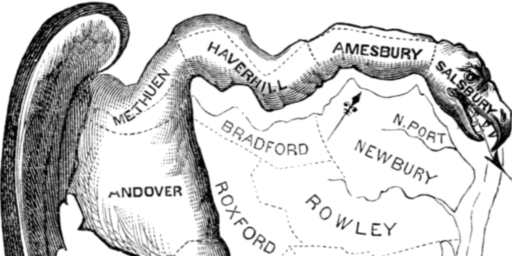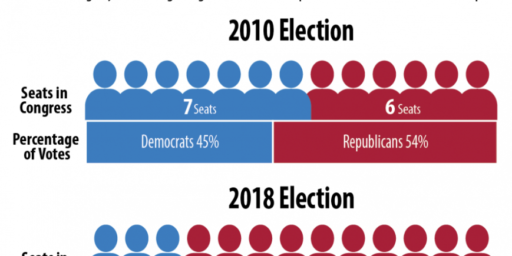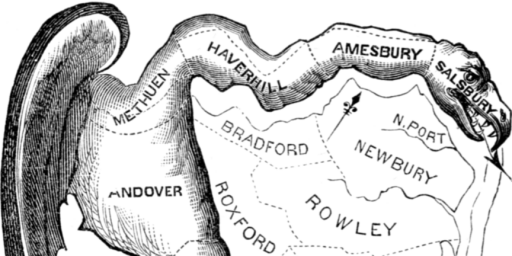New Jersey Democrats Abandon Controversial Redistricting Plan
After a barrage of criticism, New Jersey Democrats are abandoning a controversial redistricting proposal.

After a backlash from across the political spectrum, New Jersey Democrats have abandoned a controversial redistricting plan that many critics said would have enhanced Democratic control over the state legislature and the state’s Congressional Districts:
Legislative leaders in New Jersey announced this weekend they would not move forward with a proposal to redraw legislative districts that would have essentially written gerrymandering into the State Constitution.
Stephen M. Sweeney, the Senate president, and Craig J. Coughlin, the Assembly speaker, both released statements on Saturday night announcing they would not put the proposal up for a vote on Monday, the final day of voting in the State Senate.
“This will give us the time and opportunity to review the input we have received from the public, our legislative colleagues and others to determine if any of these ideas would improve the proposal,” Mr. Sweeney said in the statement.
The proposal was opposed by numerous political factions: Republicans, progressives, nonpartisan pollsters, Gov. Philip D. Murphy, who is a Democrat, and Eric H. Holder Jr., the former attorney general under President Barack Obama who is the current leader of a national group combating gerrymandering.
In the final day of public hearings on the proposal last week, more than 100 progressive activists and academics testified against the bill in hearings before the Senate and Assembly committees; the authors of the bill were the lone supporters in each hearing.
But the opposition may not have been the only reason Mr. Sweeney and Mr. Coughlin canceled a vote, essentially killing the bill. Support was beginning to wane among members of their own caucus.
Two Democratic senators from Hudson County released statements last week opposing the bill, saying it could potentially dilute the power of the densely populated northeastern part of the state. Former Gov. Richard Codey, now a state senator, said he would vote against the bill. With three or four undecided votes left among the Democrats, the proposal might not have passed.
If it had passed in the Legislature, voters, through a ballot measure, would have decided whether to create an amendment to the New Jersey Constitution that would have given more power to legislative leaders in regards to redistricting.
The bill contains two key changes to how New Jersey would redraw its legislative districts in the next decade: First, it would increase the number of people on the bipartisan redistricting commission to 13, up from 11, and would allow lawmakers to nominate themselves to serve on the commission, a move that some saw as a way to strip power from Mr. Murphy.
More unpopular is a formula that would require that at least 25 percent of legislative districts be “competitive,” meaning that they must be within five percentage points of the statewide average based on the results for president, senator and governor in the past decade. That formula would likely result in a Democratic statewide average of 55 percent, according to a study by the Princeton Gerrymandering Project at Princeton University.
I first wrote about the proposal last week, and Steven Taylor followed up with his own look at the proposal, which the two of us debated in the comment thread to that post. In the meantime, though, the proposal was coming under increasing criticism from both sides of the political aisle. Republicans, of course, criticized the plan because they believed that it would dilute their political power and their chances of making a comeback in the state after suffering significant political losses in the midterm elections. In addition to Republican opposition, though, the plan also faced opposition from elsewhere. Progressives from within the state Democratic Party saw it as an effort by party bosses to consolidate their power at the expense of more activist elements of the party. This opposition included Governor Phil Murphy, who said he would campaign against the measure if it did pass the legislature and make it onto the state ballot. As many noted at the time, Murphy likely saw the measure as a challenge to his power, especially to the extent that it sought to transfer power over the redistricting commission from the Governor’s office to the legislature. Criticism of the plan also came from national Democrats such as former Obama Administration Attorney General Eric Holder who said that the measure was distracting from the national Democratic message on voting reform. Finally, as noted, several top Democrats in the heavily populated northern part of the state came out in opposition to the measure on the belief that it would lead to a reduction in their own centers of power in the state. Taken together, this ‘death by a thousand cuts’ likely meant that the measure very well could have gone down to a rather ignominious defeat had the vote gone forward today as planned.
In any case, this decision essentially means that the plan as written is basically dead as a doornail. Given the timing, it would be virtually impossible for Democrats to get the measure onto the ballot for a vote in November 2019 and most observers believe that it would have faced even more opposition if they chose to wait until the 2020 election to put the matter before voters. As for the broader issue of electoral and political reform in the Garden State, there is certainly room for improvement there but maybe now the legislature will put together a package that actually accomplishes something constructive rather than consolidating power in the hands of people who have been in power for far too long to begin with.






I think this is the right path. We don’t advance Democracy by turning around and gaming the system in the same way that Republicans have.
See, it’s not that Democratic politicians aren’t a pack of low-lifes who’d sell their firstborn for a few more votes. It’s that they still have shame, and know better than to double down when caught red-handed.
For a variety of reasons, it is good that they pulled this plan.